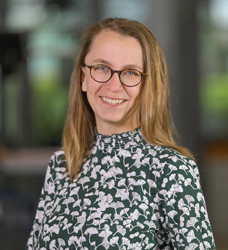Dr. Katharina Holstein
 |
Dr. Holstein studied "Systems Engineering and Technical Cybernetics" at the Otto von Guericke University Magdeburg. She did her doctorate at the Max Planck Institute in Magdeburg in the field of Systems Biology and is now working in the field of machine learning at the Fraunhofer Institute in the field of Biosystems Engineering. |
Carreer
|
Education: |
2003-2008 |
Degree in Systems Engineering and Technical Cybernetics with specializations in Systems Biology and Automation Technology, |
|
Doctorate: |
2014 |
Max Planck Institute Magdeburg |
|
Work: |
2008-2012 |
Research Associate, Max Planck Institute Magdeburg |
|
since 2013 |
Research Associate, Fraunhofer Institute Magdeburg |
During my school days I attended internships and workshops at various universities and that's how I found my field. I decided on the quite different specializations on the basis of personal interests and then went on to do my doctorate in the field of Systems Biology.
My work at the Fraunhofer IFF is shaped by projects. At the beginning of a project, data is collected from samples by means of a hyperspectral camera, this happens either in our own spectral laboratory or with project partners, e.g. by means of cameras integrated into rovers, with camera-equipped drones or by aerial photography. The data is then preprocessed by me on the computer and the relevant areas are marked. A wet laboratory analysis of the samples is usually carried out in parallel. Then I create mathematical models based on the samples and the wet laboratory analysis in order to then evaluate them using machine learning methods. I use the results of the machine learning to make predictions for our project partners.
Motivation
I chose my current subject because I wanted to work in an area that allowed me to combine more basic research and real-world application. In my previous job, I was only working in basic research. The new direction brings me greater fulfillment in my working life, as I can see firsthand how research is applied in industry and agriculture. What I enjoy most is project work with partners and the combination of data collection, which is always different, and the application of our methods.
In my opinion, research is not just a purpose in itself, but also has to be able to be applied to shape our future. Whether this application takes place at the same time or only after a few years is irrelevant. Additionally, I think that a diverse research team always looks at questions from various and more diverse perspectives. This allows the solutions to also be more diverse and enables a more heterogeneous application than is the case with homogeneous research groups.
Requirements
My job is suitable for people who put importance into the direct application of technology and knowledge and who want to experience the direct implementation of new technologies. Due to the mixture of laboratory work, research - partially in fundamentals - and the direct application, an interdisciplinary way of working is important. Interest in different research areas is important in order to work on different topics and application complexes as well as enjoyment of diverse problems.
Advice
It is essential to go your own way and not let others talk you into changing.
I have come to appreciate both coachings and trainings to strengthen professional skills as important mechanisms. I also feel it is important to build networks at an early stage. The networking of students among each other as well as the establishment of contacts to doctoral students or professors enables, for example, access to research fields that aren’t as well-known. Finding a mentor during your studies also helps you plan your career, gives you an insight into the mechanisms behind research and helps you hone your own path. The Otto von Guericke University not only offers the Ladies Night, but also other programs to establish contacts among female students as well as with women who are already established in science and research. The COMETiN program, which supports women through coaching, mentoring and training in networks, is one I particularly recommend. I think all female students, in their Bachelor’s, Master’s and Graduates degree and beyond should be part of it.
The establishment and use of these networks is very helpful in breaking up traditional structures and pushing women through the famous glass ceiling.
Challenges
During my studies, I often received criticism for not committing to one area. Today I am happy to have tried a wide variety of areas. This enabled me to test whether I liked the different areas and actually find the area in which I enjoy working the most.
In order to deal with challenges, we have built a network among the students and doctoral candidates to support each other. I was also lucky that in our small degree it wasn't a problem to ask professors for support.







